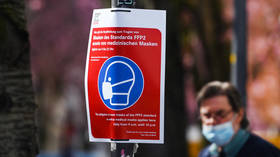Study reveals how Covid-19 vaccines affect periods

Covid-19 vaccines lead to abnormal menstruation in almost half of recipients, a new study has revealed.
Published in the Science Advances journal on Friday, the survey was carried out by researchers from the University of Illinois and Washington University School of Medicine. In April 2021, nearly 40,000 people between 18 and 80 from across the world were asked to fill out an online questionnaire about their menstrual cycles, with the scientists later analyzing and systematizing the responses.
The researchers say they launched the study after a slew of anecdotal reports from early 2021 onwards, describing unusual menstrual bleeding in women and transgender men who had received a Covid-19 vaccine.
According to the study’s findings, 42% of respondents who had previously had regular cycles reported heavier bleeding after receiving the shot. At the same time, 44% noticed no change while the other 14% reported lighter periods.
Moreover, other participants who do not typically menstruate, including transgender men and post-menopausal women, and those on long-acting contraceptives, also experienced unusual bleeding.
The respondents had received the Pfizer-BioNTech, Moderna, Johnson & Johnson vaccines or another that had been approved outside the United States. The participants also said none of them had contracted Covid-19 before getting inoculated.
The study – the largest of the kind to date – appears to corroborate the findings of previous, smaller surveys.
The researchers, however, point out that the observed changes to women’s cycles are only temporary and should in no way be used to call into question the overall efficacy and safety of Covid 19 vaccines.
“I think it’s important that people know this can happen, so they’re not scared, they’re not shocked and they’re not caught without supplies,” Katharine Lee, a biological anthropologist at the Washington University School of Medicine in St. Louis, and one of the study’s authors, explained.
The potential consequences of contracting the virus are likely to be far more serious than menstrual abnormalities, the researchers conclude, while warning that delaying vaccination even for a few weeks is not a good idea for women.
The authors said they hope more transparency around Covid 19 vaccines’ side effects could help reduce people’s hesitancy and fears.













